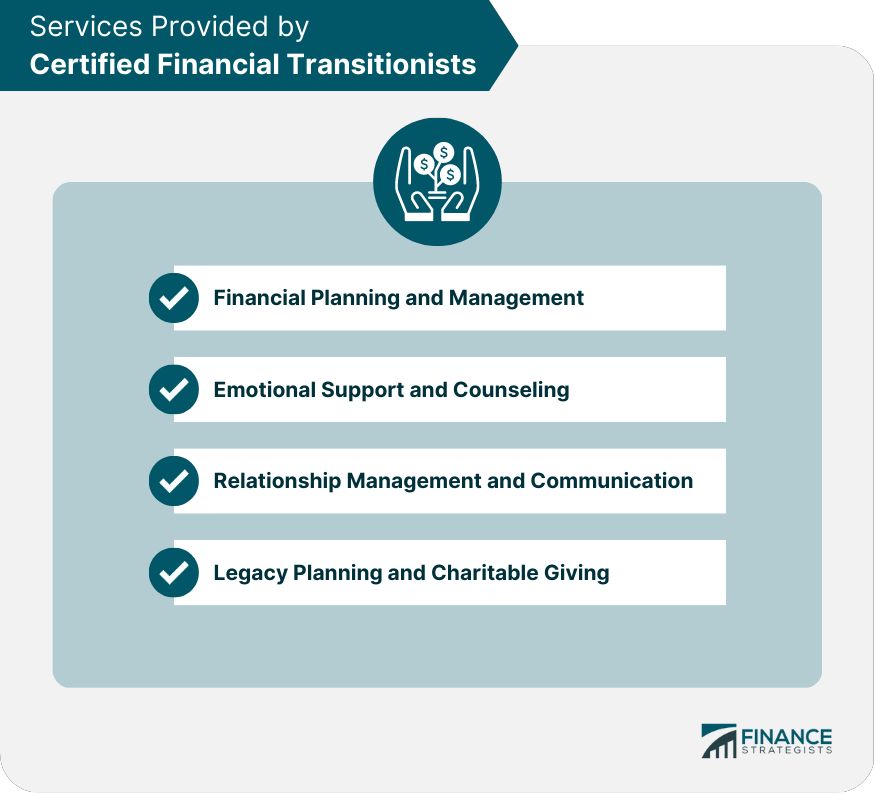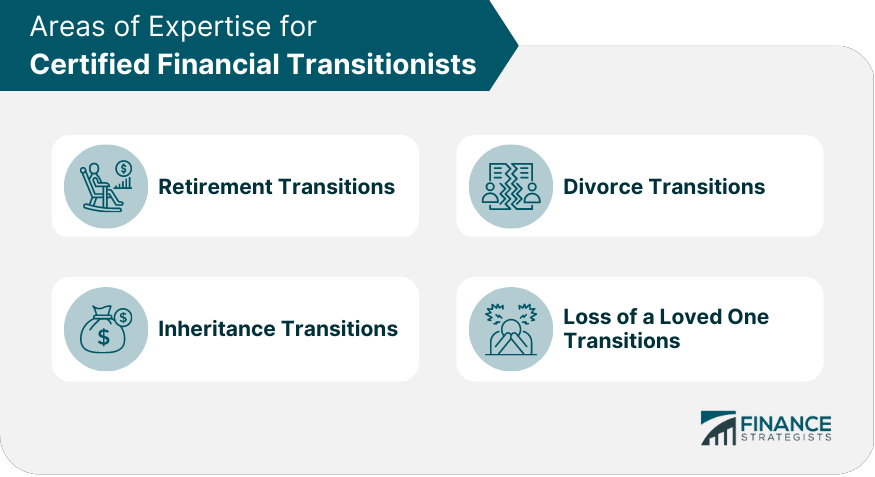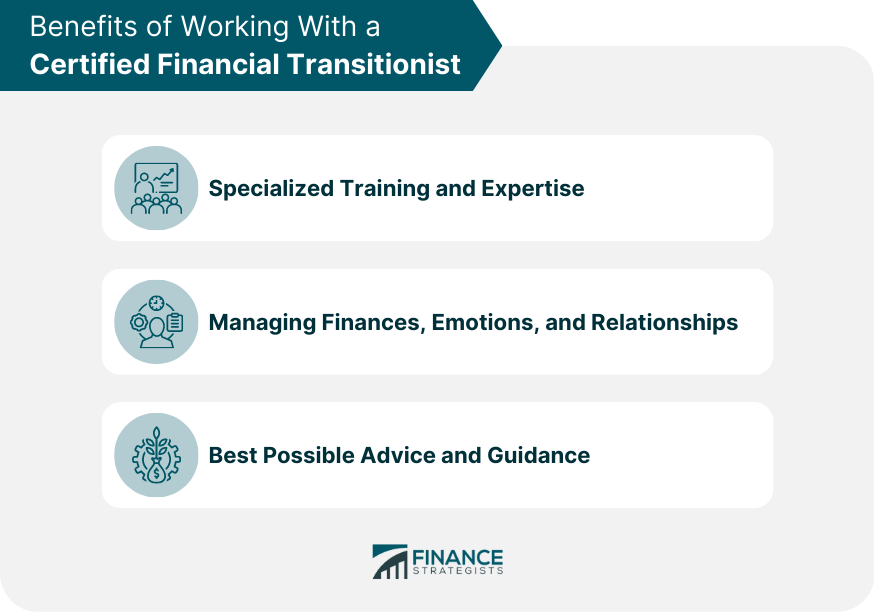Certified Financial Transitionist (CeFT) is a professional who specializes in helping individuals navigate through various life transitions that may significantly impact their financial situation, emotions, and relationships. The primary goal of a CeFT is to help their clients successfully transition from their current state to their desired future state while minimizing the negative impact of the transition. They achieve this through a combination of specialized training, expertise, and personalized support. One of the essential aspects of working with a CeFT is the level of expertise and guidance they can provide during the transition process. CeFTs are trained in a wide range of financial and emotional topics, including financial planning, grief counseling, and communication skills. They can help their clients identify their goals and values, create a customized plan, and provide ongoing support throughout the transition. Working with a CeFT can significantly increase the chances of a successful transition and can minimize the emotional and financial strain that often accompanies major life changes. Certified Financial Transitionists offer a variety of specialized services to help individuals navigate the financial and emotional challenges of major life transitions. One of the primary services provided by CeFTs is financial planning and management. This includes assessing the client's current financial situation, identifying their financial goals, and creating a plan to achieve those goals. CeFTs can help their clients understand the various financial options available to them and make informed decisions based on their unique circumstances. They can also provide ongoing support to ensure that the plan remains on track and adjust it as needed based on changes in the client's circumstances. Transitions can be emotionally challenging, and CeFTs understand this. They are trained to provide emotional support and counseling to help their clients manage the various emotions that come with major life changes. This includes grief counseling, stress management, and coping skills. CeFTs can help their clients process their emotions in a healthy way and provide guidance on how to manage their emotions throughout the transition process. Major life transitions can often have a significant impact on relationships, including marriages, families, and friendships. CeFTs can help their clients navigate these relationships by providing communication skills training, facilitating difficult conversations, and helping to manage conflicts. They can also provide guidance on how to maintain healthy relationships during the transition process and beyond. CeFTs can also help their clients plan for their legacy and charitable giving. This includes identifying their values and goals, creating a plan for charitable giving, and ensuring that their estate plan reflects their wishes. CeFTs can also provide guidance on how to communicate their plans to their loved ones and ensure that their legacy is preserved. Certified Financial Transitionists have expertise in various areas, helping individuals manage different aspects of life transitions. Retirement is a major life transition that requires careful planning and management. CeFTs can help their clients navigate the various financial and emotional aspects of retirement. This includes creating a retirement income plan, managing healthcare costs, and finding purpose and fulfillment in retirement. Divorce can be emotionally and financially challenging, and CeFTs can help their clients navigate this difficult process. They assess the client's financial situation, identifying their financial goals, and creating a plan to achieve those goals. Inheritance transitions can be complicated, particularly when there are multiple beneficiaries involved. CeFTs can help their clients navigate the various financial aspects of inheritance, including tax implications, estate planning, and managing family dynamics. Losing a loved one is a difficult time, and CeFTs can help their clients manage the various financial and emotional aspects of this transition. This includes identifying the financial implications of the loss, managing the deceased's estate, and providing support and counseling to help the client navigate the grieving process. Working with a CeFT can provide numerous benefits when navigating a major life transition. CeFTs have specialized training and expertise in various financial and emotional areas, including financial planning, grief counseling, and communication skills. This specialized training and expertise can help individuals make informed decisions and minimize the emotional and financial strain that often accompanies major life changes. Major life transitions can impact an individual's finances, emotions, and relationships. CeFTs can provide guidance and support to help their clients navigate these challenges successfully. They can help their clients manage their finances by creating a customized financial plan and support their clients manage the various emotions that come with major life changes. Finally, CeFTs can help their clients manage relationships by providing communication skills training, facilitating difficult conversations, and helping to manage conflicts. CeFTs are held to a high standard of certification and must adhere to a strict code of ethics. This means that individuals working with a CeFT can trust that they are receiving the best possible advice and guidance. CeFTs are committed to providing personalized and customized support to help their clients achieve their goals and navigate the transition process with confidence. Below are some things to consider on how to find a certified professional transitionist: When searching for a CeFT, it is essential to do your research and find someone who specializes in the area of your specific transition. You can start by asking friends or family members for referrals, checking with professional organizations or associations, or searching online. Once you have a list of potential CeFTs, it's important to conduct further research to determine if they are a good fit for your needs. This may include reviewing their website, reading client reviews, and checking their credentials. During the selection process, it's essential to ask the right questions to ensure you choose someone who has the experience, expertise, and compatibility that you need. Some essential questions to ask include their qualifications and certifications, their experience working with individuals in similar transitions, their approach to financial planning and management, and how they handle conflicts or challenges that may arise. By asking these questions, you can gain a better understanding of the CeFT's approach and determine if they are the right fit for your needs. Working with a CeFT involves a collaborative approach that requires honesty, openness, and communication. During the initial consultation, the CeFT will assess your current financial situation, identify your goals and values, and create a customized plan that reflects your unique circumstances. As the process moves forward, the CeFT will provide ongoing support, including financial planning and management, emotional support and counseling, and relationship management and communication. It is important to be open and honest with your CeFT and communicate any concerns or challenges that arise during the process. A Certified Financial Transitionist is a professional who specializes in helping individuals navigate through various life transitions that may significantly impact their financial situation, emotions, and relationships. CeFTs provide a wide range of services, including financial planning and management, emotional support and counseling, relationship management and communication, and legacy planning and charitable giving. They have specific areas of expertise, including retirement transitions, divorce transitions, inheritance transitions, and loss of a loved one transitions. Working with a CeFT can provide numerous benefits, including specialized training and expertise, managing finances, emotions, and relationships, and providing the best possible advice and guidance. When searching for a CeFT, do your research and find someone who specializes in the area of your specific transition. By working together with a CeFT, you can successfully navigate your transition and achieve your desired future state. It is also important to note that a CeFT should be seen as a complement to a financial advisor, not a replacement. Working with a CeFT can help ensure that you have a comprehensive and personalized approach to your financial planning and management.What Is a Certified Financial Transitionist (CeFT)?
Services Provided by Certified Financial Transitionists
Financial Planning and Management
Emotional Support and Counseling
Relationship Management and Communication
Legacy Planning and Charitable Giving

Areas of Expertise for Certified Financial Transitionists
Retirement Transitions
Divorce Transitions
Inheritance Transitions
Loss of a Loved One Transitions

Benefits of Working with a Certified Financial Transitionist
Specialized Training and Expertise
Managing Finances, Emotions, and Relationships
Best Possible Advice and Guidance

Finding and Working with a Certified Financial Transitionist
Searching for a Certified Professional Transitionist
Questions to Ask When Choosing a Certified Professional Transitionist
Expectations During the Process of Working With a Certified Professional
Bottom Line
Certified Financial Transitionist (CeFT) FAQs
A Certified Financial Transitionist is a professional who specializes in helping individuals navigate through various life transitions that may significantly impact their financial situation, emotions, and relationships.
Certified Financial Transitionists provide a wide range of services, including financial planning and management, emotional support and counseling, relationship management and communication, and legacy planning and charitable giving.
Working with a Certified Financial Transitionist can provide numerous benefits, including specialized training and expertise, managing finances, emotions, and relationships, and providing the best possible advice and guidance.
When searching for a Certified Financial Transitionist, it's essential to do your research and find someone who specializes in the area of your specific transition. You can start by asking friends or family members for referrals, checking with professional organizations or associations, or searching online.
Working with a Certified Financial Transitionist involves a collaborative approach that requires honesty, openness, and communication. During the initial consultation, the CeFT will assess your current financial situation, identify your goals and values, and create a customized plan that reflects your unique circumstances.
True Tamplin is a published author, public speaker, CEO of UpDigital, and founder of Finance Strategists.
True is a Certified Educator in Personal Finance (CEPF®), author of The Handy Financial Ratios Guide, a member of the Society for Advancing Business Editing and Writing, contributes to his financial education site, Finance Strategists, and has spoken to various financial communities such as the CFA Institute, as well as university students like his Alma mater, Biola University, where he received a bachelor of science in business and data analytics.
To learn more about True, visit his personal website or view his author profiles on Amazon, Nasdaq and Forbes.











